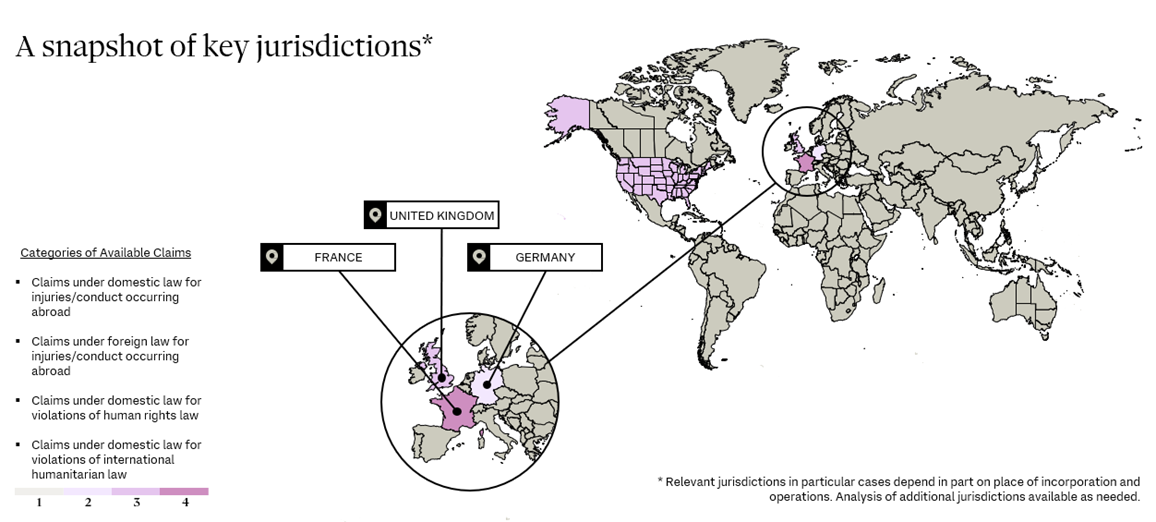As companies chase growth in emerging markets, many find themselves operating in increasingly complex geopolitical landscapes, marked by armed conflict and political instability. The commercial potential? Significant. The legal exposure? Unpredictable. These regions are not just operationally complex—they are a legal minefield.
Litigation risks can arise not only from direct involvement in conflict-related activities, but also from continued commercial operations that may be perceived as supporting or enabling a party to the conflict.
While the United States has long been a prominent forum for such litigation, other jurisdictions, including France, Germany, and the United Kingdom, are increasingly asserting jurisdiction over corporate conduct abroad. Below are the highlights, but further analysis of litigation risks in these jurisdictions—including evolving case law and enforcement priorities—will be covered in upcoming blogs in this series, so stay tuned.

Litigation Risks in the US
Operating in high-risk jurisdictions can expose companies to litigation in US courts, even when the underlying conduct occurs entirely outside of the US. These risks are not limited to companies with a physical presence in the US. Financial, contractual, or operational ties to the US can be enough to trigger litigation. And once proceedings begin, they can be lengthy, expensive, and reputationally damaging.
Litigation risks include claims under multiple statutes. The Anti-Terrorism Act (ATA) allows US nationals injured in acts of international terrorism to sue both principal wrongdoers and those who aid or abet them. As we discuss here, in recent years, ATA litigation has surged. The Alien Tort Statute (ATS) allows civil claims for violations of international law, and ATS claims may enjoy a resurgence following a recent Ninth Circuit Court of Appeals opinion holding that US corporations—not just natural persons—can be held liable under the ATS, including for aiding and abetting human rights abuses.[1] And the Torture Victim Protection Act (TVPA) creates a civil cause of action for plaintiffs subjected to torture or extrajudicial killing. Although the TVPA does not permit claims against corporations, the act remains a significant litigation risk for individuals associated with corporate operations in high-risk jurisdictions.
United Kingdom: Expanding Civil and Criminal Liability
The UK is becoming an increasingly active forum for litigation arising from corporate conduct in high-risk jurisdictions. Although rarely utilized, UK courts have jurisdiction to prosecute individuals and companies for facilitating war crimes and crimes against humanity, even when the alleged acts occur overseas.
Civil claims are gaining momentum too. UK parent companies are being challenged over the actions of subsidiaries and contractors abroad.
France: Universal Jurisdiction and Vigilance Obligations
France presents unique litigation risks due to its expansive view of "universal jurisdiction" over crimes against humanity and war crimes. French courts assert jurisdiction over and can prosecute foreign individuals and companies for these crimes even if they occur abroad. Recent years have seen a rise in criminal investigations targeting companies operating in high-risk jurisdictions, supported by specialized prosecution units and active NGO involvement.
On the civil side, the Duty of Vigilance Act, enacted in 2017, applies to large companies headquartered in France. It requires these companies to publish and implement a vigilance plan to identify and prevent serious human rights, health, safety, and environmental risks across their operations. Non-compliance can lead to direct claims by affected individuals and court-ordered injunctions.
Germany: Supply Chain Accountability and Emerging Tort Claims
The primary source of exposure in Germany stems from the German Supply Chain Act, which requires companies to avoid causing or contributing to human rights or environment-related risk. The Act carries severe penalties for non-compliance, including fines up to 2% of the company’s average annual turnover and exclusion from public contracts.
In addition to regulatory enforcement, Germany is witnessing a rise in civil litigation based on general tort law principles. Claimants, often supported by NGOs, are increasingly seeking to hold companies liable for human rights and environmental harms suffered abroad.
Key Takeaways
Legal risk travels with your business. Operating in high-risk jurisdictions can trigger litigation far beyond that jurisdiction’s borders. Courts in the US, UK, France, and Germany are increasingly willing to scrutinize corporate actions abroad, especially when human rights, terrorism, or violations of international law are involved.
And the consequences go beyond the courtroom. Reputational damage, regulatory pressure, and personal liability for executives are increasingly part of the equation.
Navigating this evolving landscape requires more than compliance—it demands a proactive legal strategy. That means rigorous due diligence, cross-border risk mapping, and clear governance around operations in conflict-affected areas.
***
This blog post is part of an ongoing series exploring the legal, commercial, and strategic complexities of operating in conflict zones and high-risk jurisdictions. Contributors to this series include Freshfields attorneys Timothy Harkness, Kate Cooper, Joshua Kelly, Sylvia Noury, Alexandra van der Meulen, Carsten Wendler, Piusha Bose, Maria Slobodchikova, Paige von Meheren and Heather Cameron. Stay tuned for upcoming posts, and please reach out with topics, questions, or experiences you’d like us to cover as part of this ongoing conversation.
For a collection of related previous posts and webinars, please click this link.
[1] Doe I v. Cisco Systems, 73 F.4th 700 (9th Cir. 2023).


